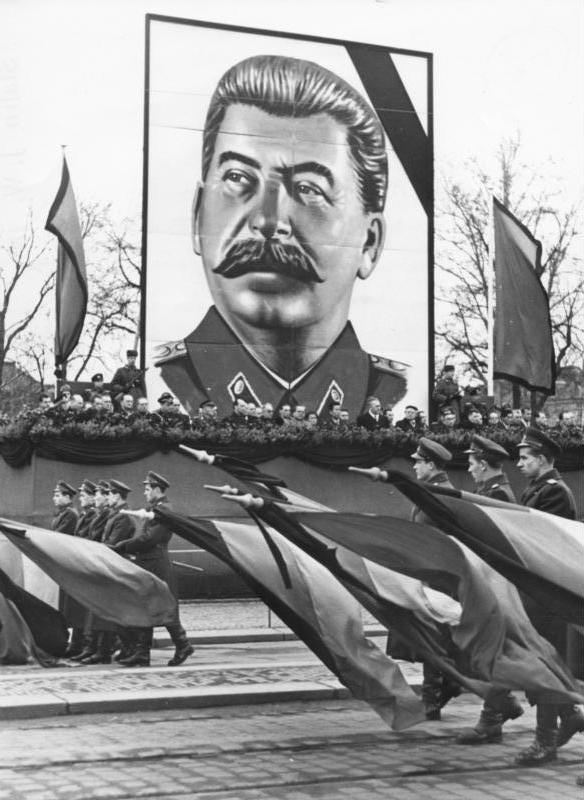"Marxism and Problems of
Linguistics" is a curious pamphlet, written by Joseph Stalin, otherwise
better known as the head of party and government in the Soviet Union. It seems
the old fox was a busy man. The articles included in this work were penned for
Pravda in 1950.
According to Frederick Copleston's history of Russian philosophy, this pamphlet actually made it easier for Soviet philosophers to question Marxist dogma, although mostly after the author had been safely buried. Stalin attacks one N.Y. Marr, apparently some kind of Lysenko of Soviet linguistics, in favour of more mundane linguistics. For instance, Stalin points out that the theory of an Indo-European proto-language is probably true. (Thanks for noticing.) Stalin actually attacks stale "Marxist" dogma, pointing out that the Soviet party has revised Marx and Engels on a number of points, including the much-vaunted dying away of the state. If Marxism is ever-changing, perhaps it can change some more? Stalin also denies that the transition from quantity to quality has to be explosive. His (unconvincing) example is that the dramatic collectivization of the Russian peasantry was wholly peaceful. While this is, of course, a self-serving lie, it nevertheless has consequences for Marxist philosophy, which holds that societal changes are virtually always revolutionary in character, precisely because "quantity" changes to "quality". Here, Stalin has quietly revised Marxism on a very fundamental point. Earl Browder, anyone?
In the main piece, Stalin wrestles with the question of language. From a schematic-dogmatic Marxist standpoint, language is indeed a vexing question. Is language part of the superstructure? Or is it part of the base? After all, language changes less rapidly and less dramatically than society at large. The Russian language didn't change its basic structure after the October revolution. Indeed, it's similar to the Russian spoken by Pushkin, when Russia was still "feudal". He could also have mentioned the resuscitation of Hebrew in Israel, or the abject failures of artificially constructed languages such as Solresol and Volapük, as evidence of his thesis. (I suppose Stalin had some gaps in his linguistic expertise.)
Language, it seems, serves all classes of society and changes very slowly. What on earth to do with it? Stalin never reaches a clear conclusion. At times, he seems to be suggesting that language is somehow a part of the base, since no production is possible without a common language. In other sections, he seems to be arguing that language is a neutral, supra-class phenomenon standing outside the Marxist categories of base and superstructure altogether.
Of course, the real politics of Stalin's regime were rather different. Non-Russian languages had to abolish their Latin or Arabic scripts, instead adopting the Cyrillic alphabet. Some languages were artificially created and Russified (the "Moldavian" language comes to mind). Unless I'm mistaken, Yiddish was banned at some point by our author himself. And so on. In practice, Stalin did seem to regard language as part of the ideological superstructure!
Still, it's interesting to speculate about what political calculations were behind Stalin's intervention in the debate over linguistics. Perhaps his new theory was designed to promote social peace in a Soviet Union badly split between bureaucrats, workers and peasants? Hence, we get the curious spectacle of a Marxist promoting the idea that language is supra-class, that the class struggle doesn't disintegrate society, that there should be no further "explosions" in Soviet society, etc. The erring Marr (who was apparently already dead by the time this debate took place) seems to have been more "radical", and Old Joe actually compares him to Proletkult, a band of crackpot Bolsheviks who attempted to eradicate all old culture during War Communism. Lenin eventually put an end to their depredations.
To a causal reader, "Marxism and Problems of Linguistics" will be boring and meaningless. I read the work years ago, and assumed that linguistics was a kind of hobby in which Stalin indulged from time to time. Some dictators, after all, have intellectual hobbies. However, it seems that Uncle Joe had a political point with his crypto-revisionist musings. But then, he was the head of party and government of the Soviet Union, remember?

No comments:
Post a Comment